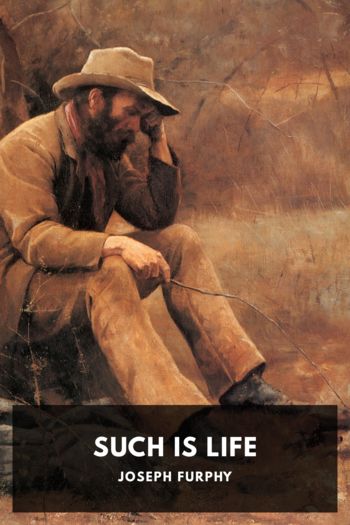Such Is Life - Joseph Furphy (philippa perry book txt) 📗

- Author: Joseph Furphy
Book online «Such Is Life - Joseph Furphy (philippa perry book txt) 📗». Author Joseph Furphy
“You’re a Catholic—aren’t you, Rory?” I speculated, one evening, struck by the simple piety of some asinine remark he had made.
A startled look of remonstrance and deprecation was his only reply. However, as it has always been my rule to seek information at first hand, I tried, in a friendly and confidential way, to draw him out respecting certain of his Church’s usages and tenets, which I knew to be garbled and falsified by Protestant bigotry. But it was evident that throughout every fibre of his moral nature there ran a conviction that the mere mention of Purgatory or Transubstantiation would be fatal to our friendship. And he, at all events, would be no party to the unmasking of that great gulf which hereditarily divided us.
[It may be worth while, before we go any farther, to inquire into the nature and origin of this gulf—not merely for the sake of information, but because it is a question which affects the moral health of our community.
When Australia was first colonised, any sensible man might have foreboded sorrel, cockspur, Scotch thistle, etc., as unwelcome, but unavoidable, adjuncts of settlement. A many-wintered sage might have predicted that some colonist, in a fit of criminal folly, would scourge the country with a legacy of foxes, rabbits, sparrows, etc. But a second and clearer-sighted Jeremiah could never have prophesied the deliberate introduction of hydrophobia for dogs, glanders for horses, or Orangeism for men. Yet the latter enterprise has been carried out—whether by John Smith or John Beelzebub, by the Rev. Jones or the Rev. Belphegor, it matters not now. Someone has carried his congenial virus halfway round the globe, and tainted a young nation.
It is no question of doctrine. There is a greater difference between the Presbyterian and Episcopalian creeds than between the latter and the Catholic. But in tracing sectarian animosities back to their source, you may always expect to crash up against vested interests. For instance, the great fact of the English Reformation was the confiscation of Church property. Afterward, a Protestant England submitted peaceably to the Inquisition; but when Mary proposed restitution of the abbey tenures—whoop! to your tents, O Israel! The noble army of prospective martyrs couldn’t conform to that heresy; and the stubborn Tudor had to back down. Again, Wesleyanism tapped the offertory of Episcopalianism, and thus earned the undying hatred of that Church—though in point of doctrine, the two are practically identical. But the prejudice of the Irish Protestant against the Irish Catholic has the basest origin of all.
The English and Scotch colonists drafted into Ulster by Elizabeth, James I, Cromwell, and William III, always evinced a tendency to become Irish in the second generation. The reason is plain. Devil-worship—the cult of fear—was the territorial religion of Ireland; and, in this bitter fellowship, native Catholic and acclimatised Protestant sank their small sectarian differences. The almighty and eternal Landlord, of course, was the Power who had to be placated by tribute and incense, approached on all fours, and glorified in the highest.
We don’t know much of the nonpolitical history of Ireland during the 18th century, and indeed there is not much to be known. An Irish Parliament, consisting solely of landlords and their nominees, legislated as men do when the personal equation is allowed to pass unchecked. Meanwhile the agent collected such rents as he could get, with an occasional charge of slugs thrown in gratis: and the finest peasantry in the world slaved, starved, lied, stole, attended the means of grace, got drunk as often as possible, married and gave in marriage, harnessed itself to the landlord’s carriage whenever that three-bottle divinity deigned an avatar, and hoarded up its pennies for the annual confiscation. Broadly speaking, it rendered unto Caesar the things that were Caesar’s, and unto God the things that were God’s—social-economic conditions being so arranged that Caesar’s title covered everything except an insignificant byproduct of atrophied souls.
However, we are concerned only with Ulster, where the native element of population, oblivious to Thrift, and instinctively loyal to anything in the shape of supremacy, had become alloyed with an ingredient derived from the most contumacious brood at that tirne in Western Europe, namely, the so-called Anglo-Saxon—a people unpleasantly apt in drawing a limit-line to aggression on its pocket, and by no means likely to content itself with an appeal to the Saints or the Muses. But was there no sectarian line of cleavage?—was there no party spirit abroad, seeing that, for the alleged safety of the Protestant population, the Catholics lived under severe penal laws? Well—
“We hold the right of private judgment in matters of religion to be equally sacred in others as in ourselves; and, as men, as Christians, and as Protestants, we rejoice in the relaxation of the penal laws against our Roman Catholic fellow-subjects; and we believe the measure to be fraught with the happiest consequences to the union and prosperity of Ireland.”
That is part of a resolution carried with only two dissentient voices in a meeting composed of the delegates of 143 corps of Ulster Volunteers, numbering 25,000 men. The meeting was held at Dungannon, Tyrone, in 1782. The Volunteers were tenants who, in 1778, had spontaneously enrolled themselves for defence against foreign invasion; all Protestants, of course, inasmuch as the possession of arms, except by special license, was prohibited to Catholics;—though at this time (the American War being then in progress) the feeling of the Irish Protestant was strongly revolutionary, while the Irish Catholic, true to his fatal instinct of illogical veneration, was distinctly loyalist. Otherwise, the bond of a common nationality had overborne sectarian estrangement; and never before or since has Ireland seen a period when the professors of those hostile creeds got drunk





Comments (0)